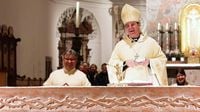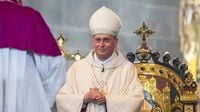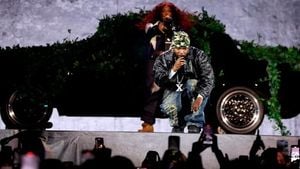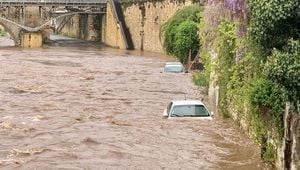On Easter Sunday, April 20, 2025, Bavarian bishops delivered powerful messages emphasizing the significance of the Christian faith in understanding Western culture. Cardinal Reinhard Marx of Munich stated that the essence of the West cannot be grasped without acknowledging Christianity, highlighting the importance of Sunday worship and the celebration of the Resurrection. He expressed that the belief in God, who became our brother in Jesus, is vital for cultural identity, saying, "Without this confession, without this experience, something essential is missing in our culture. This is my conviction. And to advocate for it is our Easter mission."
Evangelical State Bishop Christian Kopp of Bavaria echoed this sentiment, declaring Easter as the greatest festival of hope in the world. He noted that the power of Easter is greater than any challenge, motivating individuals to act with charity, justice, and courage for peace. Kopp's message resonated as a call to action during these uncertain times.
Archbishop Herwig Gössl of Bamberg also shared his insights, viewing the Easter message as a remedy for confusion in today's world. He questioned whether Easter had become a mere commercial farce, dominated by chocolate bunnies and eggs, rather than a profound celebration of hope. Gössl emphasized that Easter should inspire people to spread hope, particularly to those who are vulnerable or displaced.
In a similar vein, Bishop Gregor Maria Hanke of Eichstätt highlighted the open door to Jesus' empty tomb as a symbol of hope. He urged individuals not to retreat into digital bubbles but instead to open doors to peace, dialogue, and new life in God. Hanke's call for engagement and positivity resonated throughout the Easter celebrations.
Pope Francis, addressing tens of thousands of believers in St. Peter's Square, offered the traditional Urbi et Orbi blessing, reinforcing the message of hope that Easter embodies. Bishop Stefan Oster of Passau encouraged the faithful to trust in life and confront their fears. He acknowledged the pressing issues of climate change, social division, and political upheaval, stressing the importance of maintaining a relationship with Christ.
Bishop Bertram Meier of Augsburg expressed that Easter is a festival of the present, countering the pervasive fear surrounding global events. He stated, "The risen Jesus is not a scaremonger. Easter brings fresh air: the scent of freedom." This perspective was echoed by Bishop Franz Jung of Würzburg, who urged people to pause and experience the healing presence of the resurrected Lord.
As the Easter message spread, Bishop Rudolf Voderholzer of Regensburg underscored the significance of the Christian faith as a source of hope and joy. He noted the baptism of six adults during the Easter Vigil as a testament to the living reality of Easter.
Archbishop Heiner Koch of Berlin called for a personal experience of God through the resurrection, while Bishop Ulrich Neymeyr of Erfurt reminded the faithful of the ongoing violence worldwide. Neymeyr highlighted that Easter serves as a beacon of hope amidst despair.
Bishop Gerhard Feige of Magdeburg articulated that the Easter message stands in stark contrast to the populist rhetoric prevalent today. He emphasized that true hope lies in life and community, rather than isolation and exclusion.
Bishop Wolfgang Ipolt of Görlitz explained that Easter can provide serenity and confidence in uncertain times, while Bishop Heinrich Timmerevers of Dresden described Easter as a festival of perspective change. He noted that how we view the world can significantly impact what we see within it.
Archbishop Stephan Burger of Freiburg spoke against discouragement in the pursuit of a more peaceful and just world, urging Christians not to abandon hope despite the challenges they face. Bishop Klaus Krämer of Rottenburg echoed this sentiment, calling for hope to counter social uncertainty.
Bishop Peter Kohlgraf of Mainz criticized the misuse of religion in the context of the Ukraine war, asserting that true peace can only be achieved through just solutions. He lamented the absurdity of Christians on opposing sides of the conflict wishing each other a happy Easter.
Bishop Karl-Heinz Wiesemann of Speyer called for resistance against nationalism and the enforcement of the law of the stronger. He emphasized that the Christian Easter message advocates for a society that respects the dignity of every individual.
Bishop Michael Gerber of Fulda expressed that Easter awakens hope for new beginnings, particularly in times of crisis. He referenced biblical stories of renewal and divine encouragement, asserting that such narratives offer hope for the present.
Bishop Stephan Ackermann of Trier called for renewed efforts to end wars worldwide, urging society to seek new perspectives and initiatives for peace. He emphasized that the Easter message reassures us that we are not alone in facing our challenges.
Archbishop Stefan Heße of Hamburg encouraged confidence, noting that Christians of all denominations celebrated Easter together this year for the first time since 2017. This unity, he suggested, breaks the shadows of historical divisions.
Bishop Dominicus Meier of Osnabrück urged a positive outlook on the world, asserting that Jesus' resurrection illuminates the path to new life. He reminded the faithful that while struggles and doubts may persist, they can be brightened by Christ's light.
Bishop Heiner Wilmer of Hildesheim called for attention to those in need and suffering, emphasizing that solidarity with the afflicted is central to the Easter message. He pointed to the Great Creed, established 1,700 years ago, as a testament to the enduring unity of faith.
Cardinal Rainer Maria Woelki of Cologne affirmed the resurrection as central to Christianity, stating that it signifies God's renewal of the world. He emphasized that through Jesus' victory over death, believers can find hope for eternal life.
Archbishop Udo Markus Bentz of Paderborn urged against responding to loss with fear, suggesting that those who believe in the resurrection can find new beginnings even in the face of despair.
Bishop Helmut Dieser of Aachen remarked on the alarming statistic that many people today struggle to believe in the resurrection, indicating a disconnect from the core of the Easter celebration. He acknowledged that while life remains incomprehensible, it is essential to embrace its mysteries.
Despite the backdrop of war and violence, Bishop Franz-Josef Overbeck of Essen expressed hope, noting the resilience of those who continue to seek reconciliation amidst suffering. He concluded that those who allow life, not death, to have the final word will embody the spirit of hope.
Antonius Hamers, the transitional leader of the Diocese of Münster, framed Easter as an invitation to advocate for peace and justice, urging believers to passionately choose life. He affirmed that while suffering is part of the human experience, God's love ultimately triumphs over darkness.







